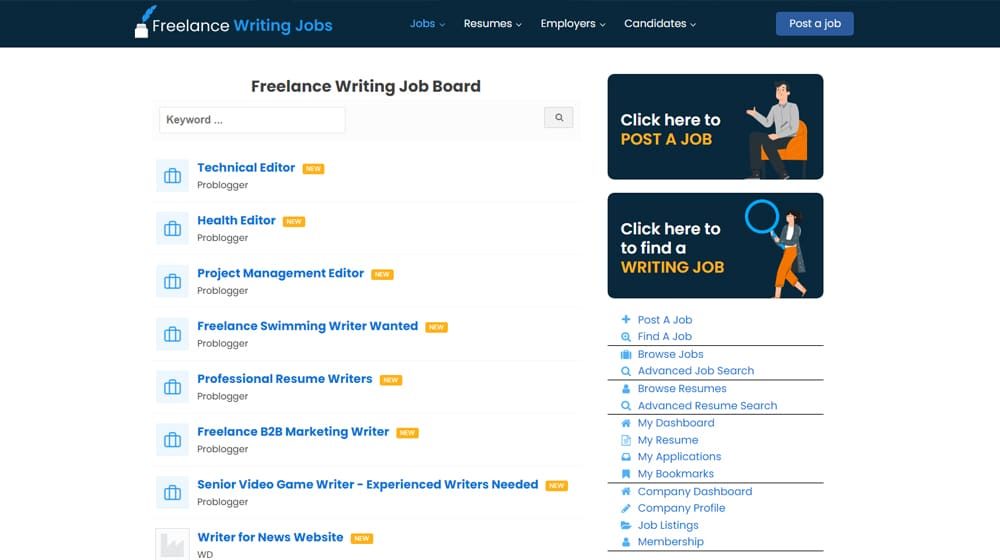In the world of blogging, there are several different kinds of people who fall under the collective description of "editor," and which one you pick depends on your needs and your position in blogging.
Either way, an editor is like a force multiplier: they make your blog better at doing whatever you're trying to get it to do, whether that means polishing up the writing, guiding the use of language throughout your posts, or developing your overall content plan.
Let's dig into how to hire a blog editor, starting from the beginning: what does a blog editor even do?
As I mentioned, the term "editor" can apply to a few different roles and levels of service in the industry. In general, you can divide it into three groups.
The first is the substance editor. These are the people who review every single blog post you publish. They're looking for things like typos, misused words, grammatical errors, issues in flow, broken sentences, and other issues. Essentially, they're copyeditors and line editors. They use a combination of personal experience and automated tools like Grammarly to make sure your writing is polished.
Substance editors don't substantially change the flow, meaning, or style of your writing. They simply take what you give them and polish it to a mirror shine. They may also have the occasional extra duty, like enhancing keywords or checking freelance submissions against Copyscape for plagiarism, but they're unlikely to do fact-checking, outline editing, flow editing, or other large-scale changes to the content you're creating.
The second is the content editor. Content editors tend to be higher-level and work less with your work and more with you. This story from Michael Lynch about working with an editor is a good example. The editor he hired didn't read through every post he wrote or writes; instead, she read through enough of them to give him examples of common mistakes and issues he makes, helps guide him towards more effective writing, and improved his overall style. He doesn't hire her to edit every post, but rather a limited selection of key posts and the posts he wants to put the most attention into.
Content editors look at style, logical flow, tone, voice, and factual accuracy. They can perform fact-checking, they can lend their expertise to enhance a piece, and they can improve audience targeting. It helps for a content editor to be a subject matter expert, or at least experienced in the subject, to lend a better perspective to the editing suggestions.

The third is the managing editor. Managing editors often don't look directly at the content you produce and publish. Instead, they're doing behind-the-scenes work. They identify keywords and topic opportunities. They help identify audiences you can reach and tap. They analyze your past performance to find examples of content that has performed well in the past and help identify ways you can replicate that success.
Managing editors are often necessary for multi-author blogs, blogs with numerous freelance contributors, or just cases where you'd rather be writing and leave the research to people more experienced in management.
 Which editor do you need? That depends on you and your business. Generally, a substance editor is a good idea for virtually any blog. A content editor is good for blogs that are trying to push past the initial humps of flat traffic and stasis or slow growth. Managing editors are good for larger sites and multi-author blogs that need an overall aim and guidance. Often, the largest blogs have all three kinds of editors.
Which editor do you need? That depends on you and your business. Generally, a substance editor is a good idea for virtually any blog. A content editor is good for blogs that are trying to push past the initial humps of flat traffic and stasis or slow growth. Managing editors are good for larger sites and multi-author blogs that need an overall aim and guidance. Often, the largest blogs have all three kinds of editors.When you're considering hiring an editor, what should you look for?
First, you want familiarity with your subject. They don't need to be true experts – in fact, the best experts aren't likely to be working as editors – but they should at least know what you're talking about when you mention jargon or industry terminology. You want them to be able to spot common issues and errors.
You also want an editor to have experience editing at whatever level you're hiring them. If you're hiring a managing editor, you probably don't want to be hiring someone whose primary experience is in using Grammarly to streamline content. Instead, you want someone with experience in keyword research and content targeting.

When an editor pitches their services to you, make sure to look at the kind of example feedback they give. How well do they convey their meaning, what examples do they pick, and how do they present their feedback? Working with an editor can be tough, especially if you tend to take criticism personally, but an editor who isn't good at presenting feedback might not be a good fit.
To an extent, the place you find editor candidates depends on the kind of editor you're looking for. Substance editors are common and can be found in all of the usual freelance locations. Content editors are also found in those locations but tend to have their own businesses or websites as well, and may be less likely to respond through platforms like Upwork. Managing editors, meanwhile, may be best located through a job listing rather than going out and trying to find them.

You'll want to:
Either way, you'll end up with either a short list of a couple of candidates or a list of resumes to filter through to find a short list of candidates. Once you've pruned your list down to just a few potential editors, you can evaluate them to see how well they can edit your content, manage your blog, or polish what you write, depending on the kind of editor you're looking for.
When you have a particular candidate you're considering working with, you have the option to give them an editing test. Alternatively, you can hire them contingent on your ability to work well together, and after a probationary period, either extend the contract or look elsewhere.
Editing tests can be effective for substance editors. When you're concerned about their technical skills, handing them pre-polished content and asking them what they think might not get you much useful information. Instead, handing them something with errors (particularly seeded errors that can tell you if they're just using an automated tool) can tell you what they're likely to pick out and change. I wrote more about this process here.

For content editors, it's fine to simply link them to your backlog of content – particularly a few key posts you would want to be polished up as much as possible – and see what kind of feedback they give you. You don't need to introduce issues here; chances are, you already have plenty for them to pick apart. All you need to do is ask them for feedback and see what kind of comments they give you.
Managing editors are a bit different. Since you're looking for something more in line with a business plan, a keyword research document, and an audience profile, you can't really give them a link to your site and have them submit information to you. Instead, it's a much more interview-centric evaluation, where you discuss goals and processes.
In all cases, in addition to their technical skills, you want to evaluate their communication skills and how effective they are to work with. Even a great editor might not be a good fit for your subject or just for your personality, and hiring them would be a mistake.
How much does editing cost? That's a tricky question to answer:
One quirk of content editing at the high level, though, is that you're less likely to hire them to review every post and more likely to hire them a few times a year to review your writing, offer suggestions for improvements, and track your progress. That cost tends to be distributed across multiple weeks or months rather than a recurring weekly charge.
Managing editors are a different sort of beast entirely. These are more like traditional employees and can earn full salaries depending on the scale of your business and the scope of their work. Pricing here is very individualized based on your needs, niche, and scope, so it's something you'll want to talk to prospective editors about directly.

In all cases, it's a good idea to have a contract ready to go. Whether you put one together yourself, use one created by the freelancer, or negotiate one as you go, you should have something there to provide legal backing and protection for both parties. I'm a huge proponent, and you should be too.
Once you've picked an editor, evaluated them, and hired them, then you're good to go. Or are you? Maybe you might want to kick things up to the next level and hire a few blog writers as well. My job board is a great place to start, so why not post a listing today? If you have any questions, be sure to let me know! I'd love to help you out however I can.